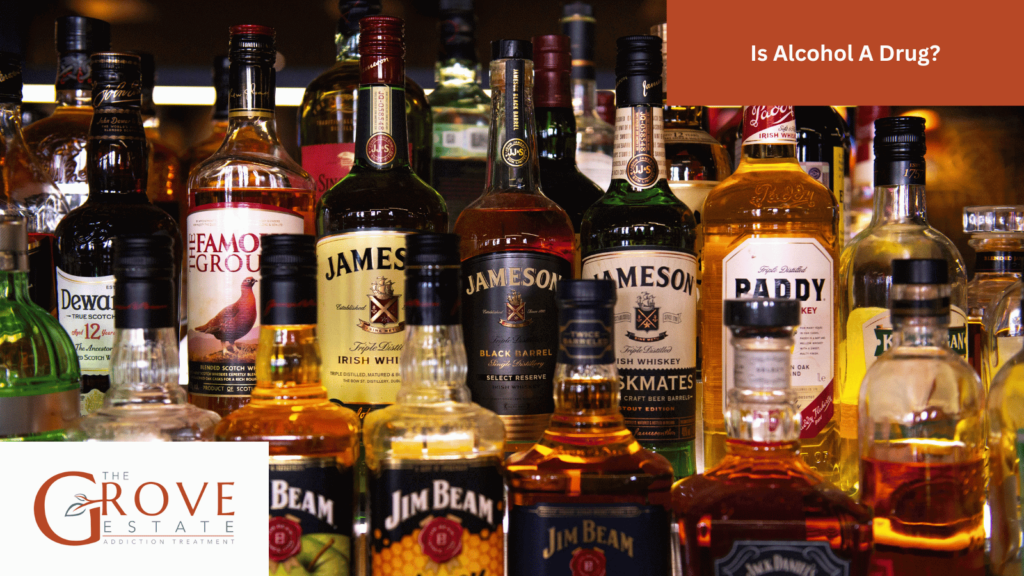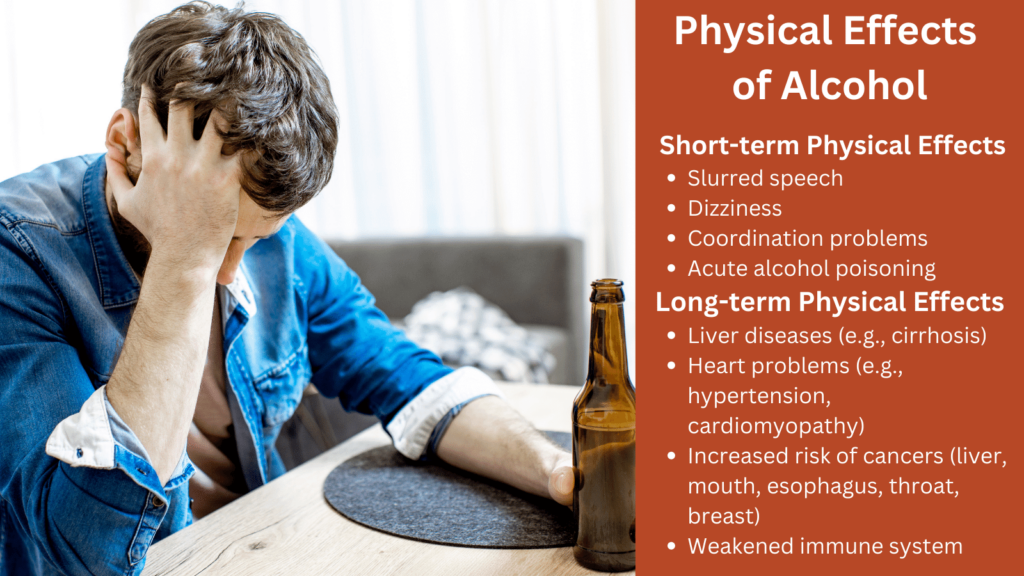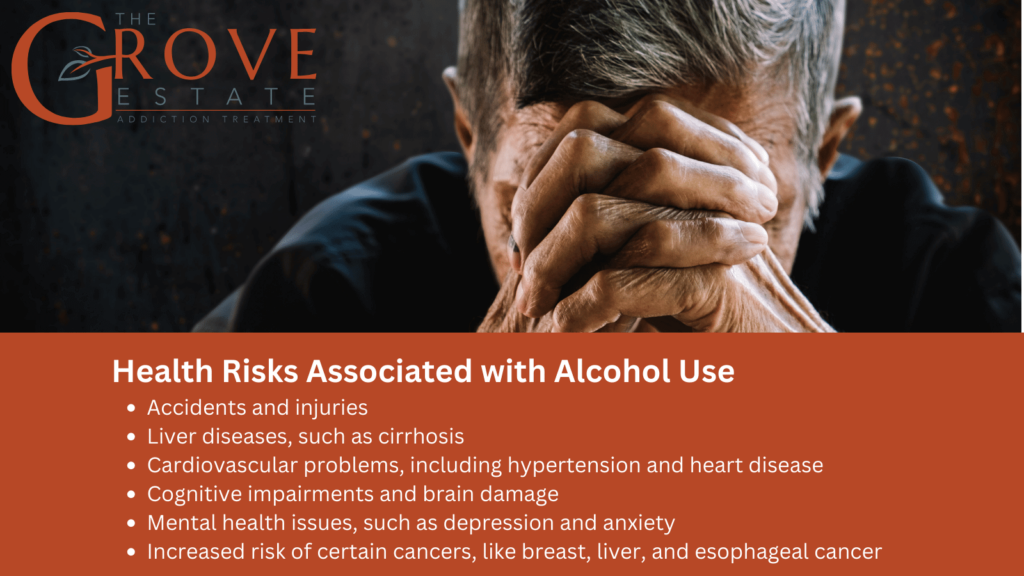Alcohol is often seen in a different light compared to other substances due to its widespread acceptance and cultural integration. However, scientifically, alcohol meets the criteria to be classified as a drug because it alters brain function and affects mood, thoughts, and behaviors.
According to the National Institute on Alcohol Abuse and Alcoholism, in 2019, 85.6% of people aged 18 and older reported that they drank alcohol at some point in their lifetime, highlighting its prevalence in society. This shows the need to understand alcohol’s true nature and effects. As a central nervous system depressant, alcohol can have significant short-term and long-term impacts on the body and mind, making it a substance that warrants careful consideration and respect.

Is Alcohol Considered a Drug?
A drug is commonly defined as any substance that causes a change in an organism’s physiology or psychology when consumed. Alcohol falls into this category because it is a psychoactive substance that has the ability to affect one’s perception, mood, consciousness, cognition, and behavior. When consumed, alcohol impacts the central nervous system and can lead to various mental and physical effects, ranging from a feeling of relaxation and euphoria to more severe outcomes like intoxication, addiction, and various health issues.
Medically, alcohol is considered a depressant because it slows down vital functions—resulting in slurred speech, unsteady movement, disturbed perceptions, and an inability to react quickly. It affects the mind and body through its interaction with the central nervous system, leading to potential abuse and dependence, categorized under alcohol use disorders.
Legally, alcohol’s classification varies by jurisdiction but is generally regulated as a legal substance for adults above a certain age, typically 18 or 21. Despite its legality, alcohol is recognized for its potential for abuse and is regulated through laws pertaining to its sale, consumption, and possession. The legal recognition of alcohol as a controlled substance, albeit one that is legally available, acknowledges its potential for harm and the need for societal management of its use and distribution.
Is Alcohol Addictive?
Yes, Alcohol’s addictive nature is primarily due to its effects on the brain’s reward system. When alcohol is consumed, it increases the release of dopamine in the brain’s reward centers, leading to feelings of pleasure and euphoria. This positive reinforcement encourages repeated alcohol use, creating a cycle that can lead to addiction. Over time, the brain adapts to the presence of alcohol, leading to tolerance (needing more alcohol to achieve the same effect) and physical dependence, where the body requires alcohol to function normally.
Alcohol’s potential for addiction can be compared with that of other substances like nicotine, opioids, and stimulants, all of which can hijack the brain’s reward pathways and lead to addiction. However, the process and speed at which addiction develops can vary. For example, substances like opioids and nicotine may lead to addiction more quickly than alcohol. Unlike these substances, which can cause significant and rapid changes in the brain, alcohol may lead to addiction more gradually, allowing users to consume it for longer periods before recognizing the dependency. Additionally, the social acceptance of alcohol can mask its addictive potential, often leading to delayed recognition and treatment of alcohol use disorders compared to other substances with more immediate and apparent negative consequences.

How Does Alcohol Impact on the Brain and Body?
Alcohol primarily affects the brain by altering the balance of neurotransmitters, chemicals that transmit signals throughout the body. In the short term, alcohol can increase dopamine levels, leading to feelings of pleasure and relaxation. However, it also impairs judgment, coordination, and reflexes by depressing the central nervous system. Over time, chronic alcohol consumption can lead to significant brain damage, affecting areas responsible for memory, decision-making, and impulse control, and can contribute to various mental health disorders.
Short-term Physical Effects
- Slurred speech
- Dizziness
- Coordination problems
- Acute alcohol poisoning
Long-term Physical Effects
- Liver diseases (e.g., cirrhosis)
- Heart problems (e.g., hypertension, cardiomyopathy)
- Increased risk of cancers (liver, mouth, esophagus, throat, breast)
- Weakened immune system
Is Alcohol a Depressant?
Alcohol is classified as a central nervous system depressant, meaning it slows down brain activity and reduces the speed of communication between the brain and the body. This classification is based on alcohol’s ability to lower inhibitions, decrease alertness, and impair cognitive and motor functions. As a depressant, alcohol can induce feelings of relaxation and sedation, especially at higher doses. Additionally, recognizing alcohol as a depressant is important in the context of alcohol use disorders, as it contributes to the development of tolerance and dependence, necessitating larger amounts of alcohol to achieve the same effects.
Does Alcohol Cause Withdrawal Symptoms and Dependence?
Alcohol withdrawal can manifest a range of symptoms, which vary depending on the severity of alcohol dependency. Common symptoms include:
- Anxiety and irritability
- Tremors or shaking
- Sweating
- Nausea and vomiting
- Insomnia
- Hallucinations
- Seizures
More severe risks involve delirium tremens (DTs), characterized by confusion, rapid heartbeat, fever, and high blood pressure, which can be life-threatening. The severity of withdrawal symptoms is often proportional to the quantity and duration of alcohol consumption, with long-term heavy drinkers facing the highest risk.
Understanding Alcohol Dependence
Alcohol dependence, or alcoholism, develops when regular, excessive drinking leads to brain chemical imbalances, necessitating alcohol to avoid withdrawal symptoms. It is marked by a strong craving for alcohol, inability to limit drinking, withdrawal symptoms during periods of abstinence, and a need to consume greater amounts of alcohol to achieve the same effects (tolerance). Dependence on alcohol can have devastating effects on an individual’s health, relationships, and social functioning, requiring professional treatment and support for recovery.
How Are Societal and Cultural Perceptions of Alcohol Shaped?
Culture and media play significant roles in shaping attitudes towards alcohol. In many societies, drinking is glamorized and portrayed as a lifestyle choice associated with success, attractiveness, and fun. Advertisements, movies, and TV shows often depict alcohol consumption in a positive light, influencing public perception and normalizing its use. Additionally, cultural traditions and norms around alcohol consumption can dictate when, where, and how much alcohol is socially acceptable to drink, further embedding alcohol in the fabric of daily life and social interactions.

How Does Alcohol Affect Public Health?
The impact of alcohol on public health is substantial and multifaceted, affecting individuals and communities across various dimensions. While moderate alcohol consumption can be part of social and cultural norms, excessive and chronic use leads to serious health risks and medical conditions. Understanding the full spectrum of alcohol-related health risks is essential for public health initiatives, policy-making, and individual decision-making regarding alcohol consumption.
Health Risks Associated with Alcohol Use
- Accidents and injuries
- Liver diseases, such as cirrhosis
- Cardiovascular problems, including hypertension and heart disease
- Cognitive impairments and brain damage
- Mental health issues, such as depression and anxiety
- Increased risk of certain cancers, like breast, liver, and esophageal cancer
Alcohol-Related Diseases and Conditions
Chronic alcohol consumption can lead to a range of diseases and health conditions, including:
- Alcoholic liver disease, encompassing fatty liver, hepatitis, and cirrhosis
- Alcohol use disorders (AUD), including alcohol dependence and addiction
- Pancreatitis, both acute and chronic
- Gastrointestinal problems, such as gastritis and ulcers
- Nutritional deficiencies, impacting overall health and immune function
Is Alcohol a Gateway Drug?
Exploring the concept of alcohol as a gateway drug, it’s important to consider its role in potentially leading individuals to experiment with other, more harmful substances. The “gateway drug” theory suggests that using less harmful substances like alcohol can open the door to trying more dangerous drugs. Studies have shown that individuals who consume alcohol are more likely to use other drugs, implying a possible link between alcohol use and the subsequent abuse of other substances.
Additionally, the legal status of alcohol often sets it apart from other drugs. Alcohol is legal in most parts of the world for individuals above a certain age, typically due to historical, cultural, and economic factors, rather than its safety profile. This legality can contribute to its perception as a less dangerous or more acceptable substance. Despite its legal status, the potential for alcohol to act as a gateway to other drugs raises questions about its classification and regulation. Unlike scheduled drugs, which are classified based on their potential for abuse and addiction, alcohol’s regulation is more lenient, even though it possesses significant addictive and harmful potential. This discrepancy in how alcohol and other drugs are viewed and regulated underscores the complexity of addressing substance abuse and addiction in society.

How Can Alcohol Addiction and Dependence Be Addressed?
Recognizing the signs of alcohol use disorder (AUD) is crucial for early intervention and treatment. Symptoms may include a strong craving for alcohol, inability to control or reduce drinking, and withdrawal symptoms when not consuming alcohol. Additionally, continued alcohol use despite negative personal and professional consequences is a strong indicator of AUD.
For treating alcohol dependence, a range of options is available, including medical detoxification, behavioral therapies, and support groups. Medical detox can safely manage withdrawal symptoms under professional supervision, while behavioral therapies like cognitive-behavioral therapy (CBT) help in developing strategies to reduce drinking and avoid relapse. Support groups, such as Alcoholics Anonymous (AA), provide a community of individuals sharing similar experiences and struggles, offering mutual support and encouragement. Tailoring the treatment approach to the individual’s specific needs is vital for effectively addressing alcohol addiction and facilitating recovery.
How Does Alcohol Compare to Other Substances?
Alcohol stands out from other substances due to its legal status and cultural acceptance. Unlike illicit drugs, alcohol is widely consumed and integrated into social and cultural practices, despite its potential for abuse and dependency. This unique position often leads to underestimation of its risks and an overemphasis on its social role.
Is alcohol a drug? True or false?
True. Alcohol is a psychoactive substance, hence it’s considered a drug because it affects the brain’s function and behavior.
Is alcohol a drug or a depressant?
Alcohol is both a drug and a depressant, affecting the central nervous system to alter mood, cognition, and behavior.
What are the 4 types of alcoholics?
The four types of alcoholics, as identified in research, include young adult, young antisocial, functional, and chronic severe subtypes.
What are the 3 types of alcoholics?
Three broad categories often discussed are binge drinkers, heavy drinkers, and alcohol-dependent individuals.
What are the long-term effects of alcohol on mental health?
The long-term effects of alcohol on mental health are profound and multifaceted. Chronic alcohol consumption can lead to a range of psychological issues, including depression, anxiety, and severe cognitive impairments. According to Healthline, the impact on mental health is due to alcohol’s ability to alter brain chemistry over time, affecting neurotransmitters that regulate mood and thought processes. This alteration can exacerbate pre-existing mental health conditions and lead to new issues, highlighting the need for awareness and treatment options for those affected.
Furthermore, understanding how long alcohol stays in your system is crucial for grasping its long-lasting effects on mental health. The duration alcohol remains in the body can affect cognitive functions and mood long after the initial consumption. This knowledge is vital for those seeking to manage or recover from alcohol-related mental health issues, emphasizing the importance of resources like how long does alcohol stay in your system for comprehensive support.
Can alcohol withdrawal cause seizures?
Yes, alcohol withdrawal can indeed cause seizures, which are among the most severe and potentially life-threatening symptoms of alcohol withdrawal syndrome. According to the National Institute on Drug Abuse, these seizures are a result of the sudden decrease in alcohol intake after a period of heavy drinking, leading to acute hyperactivity in the brain. This risk underscores the critical need for medical supervision during withdrawal, particularly for individuals with a long history of heavy alcohol use.
For those facing the challenges of withdrawal, seeking professional help is essential. Residential detox programs offer a structured and supportive environment to manage withdrawal symptoms safely, including the risk of seizures. These programs provide medical supervision and support, ensuring the safety and well-being of individuals as they begin their journey to recovery.

Share This Post



